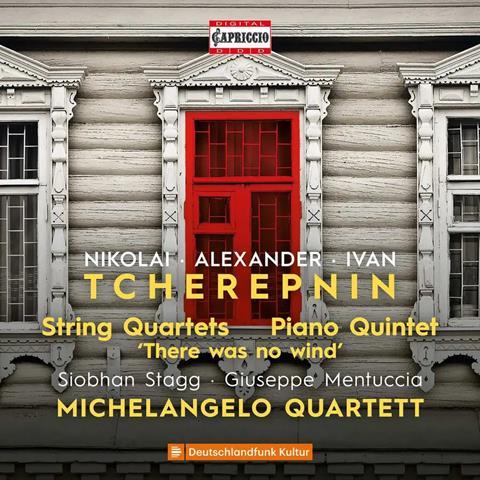Keeping it in the family: an exploration of a Russian musical dynasty

The Strad Issue: February 2024
Description: Keeping it in the family: an exploration of a Russian musical dynasty
Musicians: Siobhan Stagg (soprano) Giuseppe Mentuccia (piano) Michelangelo Quartet
Works: Nikolai Tcherepnin: String Quartet in A minor op.11. Alexander Tcherepnin: String Quartet no.1 op.36, String Quartet no.2 op.40, Piano Quintet in G major op.44. Ivan Tcherepnin: There was no wind
Catalogue number: CAPRICCIO C5503 (2 CDs)
The Tcherepnin dynasty covered an amazingly wide musical spectrum in the course of three generations. A student of Rimsky-Korsakov, Nikolai left a distinctive mark on Russian musical life in the years preceding the Bolshevik Revolution. His only String Quartet shows his teacher’s influence in its sophisticated formal scheme but also a melodic gift redolent of Borodin at his most sensuous.
Nikolai’s son Alexander came of age after the family had settled in Paris following some years spent in Tbilisi, an experience that provided him with ideas for unusual scales and harmonies based on Georgian modes. These are most evident in his Second String Quartet. Its predecessor, subtitled ‘Love Offering to St Theresa of the Child Jesus’, employs archaic melodic cells to evoke the world of the Carmelite nun, who was canonised in the 1920s. The Piano Quintet combines the composer’s idiosyncratic idiom with dogged ostinato rhythms, the piano’s percussive qualities effectively set off against the strings.
Read: Michael Barenboim named Michelangelo String Quartet’s new violist
Read: ‘Mihaela’s tiramisu is the best I’ve eaten!’ - Double Acts: Frans Helmerson and Mihaela Martin
Concert review: Nobuko Imai (viola) Martijn Willers (piano) et al
We come full circle with the last composition of Alexander’s son Ivan, written as a homage to the publisher Belyayev, with whom his grandfather had collaborated a century earlier. It is based on Russian folk songs, which Ivan illustrates with beautifully descriptive colours and textures. While Nikolai’s over-the-top effusions might have benefited from more hedonistic abandon, the Michelangelo Quartet sounds as comfortable and idiomatic with Ivan’s Impressionistic shadings as with Alexander’s angular melodies and rhythmic idiosyncracies. Faithfully recorded in a favourable acoustic, the group makes a forcefully convincing case for music that definitely deserves it.
CARLOS MARÍA SOLARE











































No comments yet